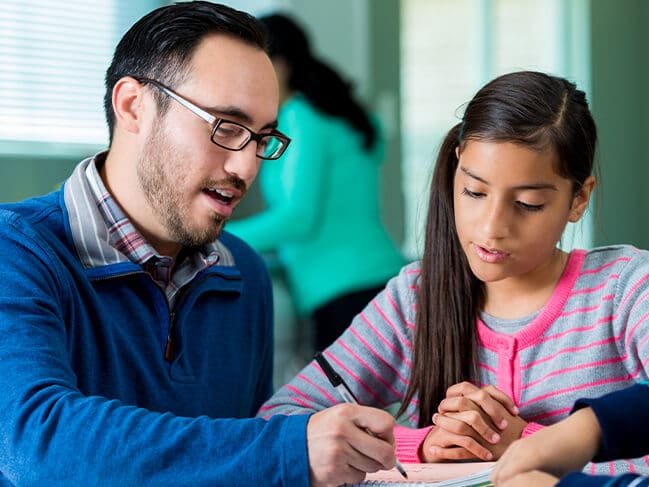Long gone are the days of afterschool specials, playing cards, and Tamagotchis. Today’s elementary school, middle school, and high school students experience all-new academic, social, and mental health challenges—including transferring to online school or a hybrid learning environment, and living at the height of social media. But with the right habits in place and strong support from parents/guardians and teachers, these challenges can become amazing opportunities for success in the school year.

7 habits that all successful middle schoolers have
According to clinical counselor Phyllis L. Fagell for Care.com, the progression from concrete to abstract thinking takes place between ages 10-15, right at the peak of middle school. During this time, middle school and early high school students learn the work they put in now can have a positive outcome later. With the help of their online or in-person educators, you can take advantage of this window of influence by helping them boost their academic success, starting with these good habits of successful students.
1. Excellent time management and prioritization
With extracurricular activities, clubs, chores, and homework on their plate, your student can easily get overwhelmed. Teaching time management skills early can help them manage their tasks by making a list and prioritizing the most important items first. Once their day or week is written out, help them break down the list further into smaller segments they can tackle one at a time.
Expert Tip: Celebrate “little wins.” Did they finish their English homework ahead of time? Did they start their piano lesson without being asked? Acknowledge and celebrate these “little wins” as they check them off during the day. It makes the act less stressful and something to look forward to instead.

2. Staying organized throughout the year
To keep their time-management momentum going, consider getting a calendar or planner for your student to regularly plan and track their to-dos during the year. In addition to organizing day-to-day tasks, encourage them to keep a tidy work space. It will make it easier to find the tools they need, and help reduce stress before a study session. Set a consistent day/time for them to organize their desk and backpack to declutter so they always have a fresh start.
Expert Tip: Show it off. Let your student pick out their planner and desk organizers and decorate it to express themselves with stickers, bright colors, fun pens, or whatever brings them joy. They’ll be more excited to use the planner and organizers and more likely to keep it tidy when they have pride in their selection.
3. Excellent note-taking during class
Through active listening and organizing thoughts, your middle schooler can use critical thinking to take informative notes that will help them remember and retain the information long after the class is over. Introduce abbreviations, symbols, color coding, and highlighting as ways to organize their thoughts and help them take notes at a reasonable pace. You can further organize their notes by differentiating each subject with separate binders for better tracking. If the class is online, consider recording the lesson to use as a reference when needed.
Expert Tip: Find their style. There are MANY different ways to take notes, and one size doesn’t fit all. Help your student play around with a few different methods to see what works best for them in terms of ease of taking notes and strengthening their study skills.

4. Being open to feedback about mistakes
The word “mistake” is often viewed as negative, which can make your middle schooler anxious and hesitant about speaking up. Mental health is always at the forefront of education as it dramatically affects their overall development—so turn it into a positive lesson. According to the Making Caring Common Project in partnership with Harvard University, you can help your child work through mistakes with these steps:
- Talk openly about mistakes.
- Reframe mistakes as opportunities for learning.
- Spot opportunities around you to help identify and solve mistakes in everyday life.
- Make receiving feedback a habit.
Expert Tip: Have a chat. Feedback is meant to be helpful and constructive, but sometimes it can be hurtful and negative, especially if it comes from a sibling or a peer. Have a regular one-on-one chat with your student to talk through how to handle these difficult situations in a mature and productive way.
5. Participating in a study group
Study groups are a great resource for support, motivation, and accountability, with the added benefits of strong social connections and long-term friendships. Students can share ideas and collaborate while learning about each others’ strengths and weaknesses, and the camaraderie can help reduce stress and anxiety.
Expert Tip: Consider online options. Making friends can be hard for many students, but there are programs out there that can help including The ASU Prep Friendship Exchange Program. It’s a personalized online program that meticulously matches students with someone based on grade levels, age ranges, and shared interests.

6. Asking for help from parents and teachers
Everyone needs help at some point, and the biggest sign of strength is knowing when to ask for it. Check in with your student and help them learn to communicate their needs and concerns clearly. If your student comes to you for help, praise their choice to ask for guidance and work with a parent or teacher (if needed) to resolve the issue. When they have a good relationship with their authority figure, they’ll be more comfortable asking for help, and they’ll learn important problem-solving skills.
Expert Tip: Use available resources. Most schools offer some form of tutoring and counseling that could be beneficial if a student needs extra help or someone to talk to. Ask their teacher to see what’s offered throughout the year.
7. Planning ahead and not cramming
According to the Washington Post, cramming for a test provides zero benefit when it comes to long-term subject retention. Instead, help them space out their studies, break down each topic into digestible pieces, and manage their time. Something as simple as organizing thoughts and outlining what they need to cover can help alleviate stress and set them up for success.
Expert Tip: Make it fun. Instead of sitting at a table and studying, take the homework out of the usual environment. Go for a walk and review flashcards, help them set up a fun study corner in their room, or move their study session to a bookstore or coffee shop.

How parents/guardians can support their child’s study habits
Parents/guardians and educators have a huge influence on the social and emotional habits of students. To help them develop successful habits for middle school, you can start by encouraging independent study, providing guidance and support, creating a healthy balance between school and personal life, teaching time-management skills, and assisting with organizing and studying. When they know that they have you on their side, they’ll feel more relaxed and confident in their abilities.
Ready to enhance your child’s academic journey through online school?
ASU Prep Digital is a great option to consider if you want to explore the flexibility and personalization of an online school program designed for middle school students who want to accelerate or catch up on their studies. Our certified teachers provide online instruction with assessments, quizzes, worksheets, and group projects, and our Learning Success Coaches help students and guide them each step of the way. Contact us today to learn more about how to switch from in-person to online school.
Learn more about online school from ASU Prep Digital
ASU Prep Digital is an accredited online school program serving students in grades K–12, recognized as Arizona’s #1 Online School by Niche.com. Our unique teaching model supports students from the safety of their homes with the latest learning technologies and several layers of personalized instruction and coaching. In addition, our program is a college prep option where online high school and university courses converge, preparing students for college acceptance and encouraging them to start earning credit toward college majors and careers.
We support districts in Arizona, while serving students and schools around the world. To learn more about ASU Prep Digital, please visit our website.
Habits of successful middle school students FAQs
What makes students successful in middle school?
There is no one-size-fits-all answer to what makes students successful in middle school. Every student is unique and has their own strengths and challenges. However, there are certain habits that successful middle school students tend to have in common. These habits can help students achieve academic success, build strong relationships, and develop important skills for their future. Some of these habits include:
- Setting and working toward goals
- Developing time-management skills
- Actively participating in class
- Building strong relationships with teachers and peers
- Taking responsibility for their learning
- Staying organized and keeping track of assignments and due dates
- Seeking help when needed and being willing to ask questions
- Engaging in extracurricular activities or hobbies outside of school
- Prioritizing self-care, including getting enough sleep, eating well, and managing stress
- Having a growth mindset and being open to learning from mistakes
What are the 7 habits of highly effective middle school students?
With the following habits, students can set themselves up for success not only in middle school but also for their future education and careers:
- Good time management skills: Successful students know how to manage their time effectively by setting aside dedicated study blocks, prioritizing tasks, and avoiding procrastination.
- Strong organizational skills: Organized students use planners or online calendars to stay on top of their responsibilities and keep their materials in order.
- Effective study habits: Successful students know how to create effective study plans, actively engage with the material, and find strategies that work best for them.
- Active participation in school: Being an active participant helps students understand and retain information better. Participating also shows teachers that you are engaged and interested in the class, which can lead to better grades and opportunities for growth.
- Strong communication skills: Successful students know how to communicate effectively by listening actively, expressing themselves clearly, and making connections with their teachers and fellow students.
- Resilience: Successful students are able to bounce back from setbacks and adapt to changes in their environment. They also have a growth mindset, understanding that mistakes are opportunities for learning and improvement.
- Adaptability: In today’s fast-paced world, being able to adapt to new situations and challenges is essential. Successful students are able to adjust their study habits, navigate through different learning environments, and take on new responsibilities with ease.

